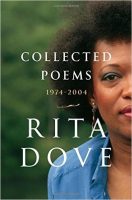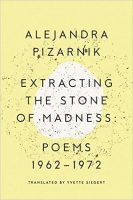May 27, 2016
Edited by David Sanders
Specimen Days
1874—Richard von Schaukal, Austria poet/writer (Eros Thanatos), is born.
1900 —Uładzimir Zylka, Belarusian poet (d. 1933), is born.
1922—Sidney AK Keyes, English poet (Iron Laurel), is born.
1926—Srečko Kosovel, Slovenian poet (b. 1904), dies.
1989—Arseny Tarkovsky, Russian poet (b. 1907), dies.

I don't believe in omens or fear
Forebodings. I flee from neither slander
Nor from poison. Death does not exist.
Everyone's immortal. Everything is too.
No point in fearing death at seventeen,
Or seventy. There's only here and now, and light;
Neither death, nor darkness, exists.
We're all already on the seashore;
I'm one of those who'll be hauling in the nets
When a shoal of immortality swims by.
—from “Life, Life” by Arseny Tarkovsky (1907-1989)
“I don’t believe in omens or fear / Forebodings. I flee from neither slander / Nor from poison. Death does not exist.” — Arseny Tarkovsky
World Poetry
Poet Kate Tempest's Raging Protest Poetry on Q and A

A confronting performance by British poet Kate Tempest on religion, war, sexism, consumerism, happiness and hypocrisy lit up Twitter overnight with some describing it as a rant and others ‘horrific'. Q and A host Tony Jones warned Ms Tempest's poem Progress might be offensive to some.
Myanmar Poet Who Wrote of Penis Tattoo Is Convicted of Defaming Ex-Leader
A poet in Myanmar who wrote in October that he had a tattoo of the country’s president on his penis was found guilty on Tuesday of defamation and sentenced to a six-month jail term. The poet, Maung Saungkha, 24, had been held since November and was released on Tuesday based on time served, according to a court in Yangon, Myanmar’s largest city.
British poet Kate Tempest on religion, war, sexism, consumerism, happiness, and hypocrisy.
Recent Reviews
Bradley Harrison Reviews Malachi Black’s “Storm Toward Morning”
by Bradley Harrison
Like the greatest formal poets, Malachi Black writes in shapes. Received forms sculpt the shape of a poem by the measure of their recursiveness: the manner in which the poem moves forward and back simultaneously. In a traditional sonnet, for example, as the speaker develops an idea, a scene, or a narrative (an argument), she also, at the end of each line, creates sonic consonance with that which precedes and/or follows.
Eye on the Sublime: Yahia Lababidi’s BALANCING ACTS
by Siham Karami
Can modern poetry ever be sublime? Variations on this question—Is epic poetry dead? Are any modern poets truly Great? Is modern poetry doomed to be the verbal selfie?—all seem focused on the plethora of similarly-styled modern poems that skew toward the personal as opposed to the epic (in the larger sense), that eschew grand themes and sweeping visions for personal vignettes and points of view, the image for its own sake, language for its own sake, minutiae. Yahia Lababidi’s poetry, in his new comprehensive collection Balancing Acts, takes another direction, quite consciously balancing his own life experience against higher things, not only spiritual but also philosophical.
Like the greatest formal poets, Malachi Black writes in shapes.
Broadsides
Is There a Good Way to Translate Chinese Poetry?
by Xujun Eberlein
A well-known contemporary Chinese poet, Han Dong, when interviewed by his English translator, said: “If your poems don’t stand up to translation into another language, then why should the translator continue to be loyal to the original? If those poems can shine in another language, then why worry if they have departed from the original?” Han Dong is regarded as the most representative figure of the “third generation” poets in the People’s Republic of China. His poems will be discussed below, but here he spoke from the stance of a poet being translated, not a reader who wants to read his poetry in translation. But it begs the question: As a reader, why would I want to read a translation that has departed from the original? Wouldn’t I be better off reading original poetry in the target language, instead of a half-baked translation?
Second Acts: A Second Look at Second Books of Poetry by James Tate and Sam Taylor
by Lisa Russ Spaar
For the first time ever, the Oxford Dictionaries picked for its 2015 Word of the Year not a word but a pictograph: an emoji depicting a face that is laughing and crying at the same time. According to the Oxford Dictionaries Language Matters blog, the “Face with Tears of Joy” was selected because it was determined to be the most-used emoji of 2015, the “word” that “best reflected the ethos, mood, and preoccupations of 2015.”
Is there a good way to translate Chinese poetry?
Drafts & Fragments
An Artist Nano-Printed A Poem That Can Live Inside Your Body
by Priscilla Frank
If you could have a poem embedded in your very flesh, what would it say? This was the question on poet and artist Jen Bervin‘s mind, and it wasn’t just hypothetical. Through her research, Bervin has learned that silk, aside from its ridiculously touchable softness, is completely biocompatible, meaning it can appear anywhere in the body and the body will accept it.
Boston’s Sidewalks Are Covered in Secret Poems You Can Only See When It Rains
by Lizzy Halberstadt and Cait Munro

"Raining Poetry" is a collaboration between Boston City Hall and the nonprofit Mass Poetry and seeks to illuminate the city's rich literary history.
Poetic WordClouds: These Are the Most Common Words in Poetry
Joanne Jeffries and Julian Yanover
Have you ever wondered what some of the most common words used in poetry are? Of course, some poets are known for writing about certain themes, but are there any surprising words that feature throughout? And, just how have these words changed over time? Are there any glaring differences when comparing classic poems with contemporary poems submitted through our community platform? This is what we sought to find out at My Poetic Side. We analyzed our entire database, which contains more than 35,000 poems, to discover the most common words in poetry, not only generally but in relation to some of the most famous poets as well.
Boston’s sidewalks are covered in secret poems you can only see when it rains.
Poetry In the News
Seamus Heaney's Family Gives Seal of Approval to Centre Set Up in His Memory

Seamus Heaney's family have said the world renowned poet would have been proud of a centre set up in his memory. The £4m HomePlace centre is being developed in the former police station in Bellaghy, Co Londonderry, to celebrate the life and work of the Nobel laureate. It will include an exhibition space and a replica of Heaney's study where he wrote many of his famous works. It is expected to open in September.
eamus Heaney’s family have said the world renowned poet would have been proud of a centre set up in his memory.
New Books
Collected Poems: 1974-2004 by Rita Dove
[Hardcover] W. W. Norton & Company, 448 pp., $39.95

Rita Dove’s Collected Poems 1974–2004 showcases the wide-ranging diversity that earned her a Pulitzer Prize, the position of U.S. poet laureate, a National Humanities Medal, and a National Medal of Art. Gathering thirty years and seven books, this volume compiles Dove’s fresh reflections on adolescence in The Yellow House on the Corner and her irreverent musings in Museum. She sets the moving love story of Thomas and Beulah against the backdrop of war, industrialization, and the civil right struggles. The multifaceted gems of Grace Notes, the exquisite reinvention of Greek myth in the sonnets of Mother Love, the troubling rapids of recent history in On the Bus with Rosa Parks, and the homage to America’s kaleidoscopic cultural heritage in American Smooth all celebrate Dove’s mastery of narrative context with lyrical finesse.
Extracting the Stone of Madness: Poems 1962 – 1972 by Alejandra Pizarnik
[Paperback] New Directions, 384 pp., $18.95

The first full-length collection in English by one of Latin America’s most significant twentieth-century poets. Revered by the likes of Octavio Paz and Roberto Bolano, Alejandra Pizarnik is still a hidden treasure in the U.S. Extracting the Stone of Madness: Poems 1962–1972 comprises all of her middle to late work, as well as a selection of posthumously published verse. Obsessed with themes of solitude, childhood, madness and death, Pizarnik explored the shifting valences of the self and the border between speech and silence. In her own words, she was drawn to "the suffering of Baudelaire, the suicide of Nerval, the premature silence of Rimbaud, the mysterious and fleeting presence of Lautréamont,” as well as to the “unparalleled intensity” of Artaud’s “physical and moral suffering.”
Once and for All: The Best of Delmore Schwartz edited by Craig Morgan Teicher
[Paperback] New Directions, 280 pp., $17.95

With his New Directions debut in 1938, the twenty-five-year-old Delmore Schwartz was hailed as a genius and among the most promising writers of his generation. Yet he died in relative obscurity in 1966, wracked by mental illness and substance abuse. Sadly, his literary legacy has been overshadowed by the story of his tragic life. Much of Schwartz’s writing has been out of print for decades. This volume aims to restore Schwartz to his proper place in the canon of American literature and give new readers access to the breadth of his achievement. Included are selections from the in-print stories and poems, as well as excerpts from his long unavailable epic poem Genesis, a never-completed book-length work on T. S. Eliot, and unpublished poems from his archives.
“Extracting the Stone of Madness” by Alejandra Pizarnik is the first full-length collection in English by one of Latin America’s most significant poets.
Correspondences
Brendan Constantine’s “Dementia, My Darling”: The Poet As Compassionate Extrovert
by James Cushing

This spring, Kate Gale’s Red Hen Press published Brendan Constantine’s fourth poetry collection, Dementia, My Darling. It’s Constantine’s most ambitious, most courageous, and most fully realized collection yet, and invites some retrospection on his not-so-quietly growing reputation.
‘White Is A Color | Black Is Art’. An Interview With Mahtem Shiferraw
by Tiah Beautement

Ethiopian-American poet Mahtem Shiferraw won the 2015 Sillerman First Book Prize for African Poets for her manuscript, Fuchsia, now published. She spoke to us about her poetry, unique sensory experiences, war and fruit.
Ethiopian-American poet Mahtem Shiferraw on poetry, unique sensory experiences, war, and fruit.
Envoi: Editor’s Notes
Where I am, summer has finally arrived. And although this poem is about the coming of spring, the feeling of the speaker towards that season mirrors my feeling towards this present one. Enjoy.
Coming
Philip Larkin
On longer evenings,
Light, chill and yellow,
Bathes the serene
Foreheads of houses.
A thrush sings,
Laurel-surrounded
In the deep bare garden,
Its fresh-peeled voice
Astonishing the brickwork.
It will be spring soon,
It will be spring soon —
And I, whose childhood
Is a forgotten boredom,
Feel like a child
Who comes on a scene
Of adult reconciling,
And can understand nothing
But the unusual laughter,
And starts to be happy.
“I, whose childhood / Is a forgotten boredom, / Feel like a child” – Philip Larkin